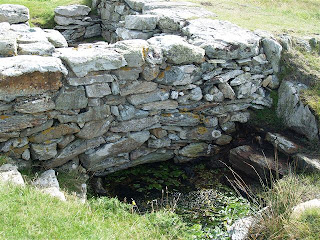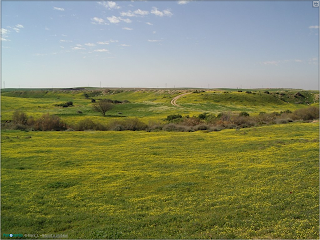
Ten of Asia’s largest rivers begin in the Himalayan glacial fields. It is the largest supply of frozen water on the planet after the two polar regions - sometimes called
"the third pole". The ice-melt from these vast reservoirs helps feed over 2 billion people - a third of the earth.
Psalm 104 celebrates God's power and love as demonstrated in fresh-water mountain streams.
 He makes springs pour water into the ravines;
He makes springs pour water into the ravines;
it flows between the mountains.
They give water to all the beasts of the field;
the wild donkeys quench their thirst.
The birds of the air nest by the waters;
they sing among the branches.
Psalm 104:10-12Photo courtesy of
Pauline Watson, Lethbridge Alberta
Proportionately rivers and streams are a miniscule drop in the global water bucket. Over 97% of the world’s water is ocean and most of the rest lies frozen in snow-pack or glaciers or stored under-ground in aquifers. But there’s still a lot left and a small portion of that – about 13,000 cubic kilometers – flows down the Amazon, Nile, Congo and Mississippi, the Danube and Rhine, the Yangtze and Yellow, the St Lawrence, Volga, Ganges and Brahmaputra, MacKenzie, Murray and Mekong, the Rio Grande and the thousands of tributaries that feed them and hundreds of other rivers like them, draining the highlands to irrigate the thirsty plains below.
Vast ecosystems depend on these rivers. Grasses, flowers, shrubs and trees grow in the water or along the shore; insects swarm above them; fish ply the currents,

graze the stony river-bed, and procreate in quiet places while other fish come in from the ocean to spawn in ponds upstream; birds feed on the grasses or fish or insects; snakes and frogs, turtles and alligators and mammals large and small quench their thirst or satisfy their hunger from the river’s bounty. All these inter-act in a dynamic balance of Nature. All of them call the river ‘home’.
Humans depend on rivers for food, drinking water and sanitation - why so many cities grow up along rivers. Rivers serve industry, commerce, travel and recreation. And the aesthetic beauty of rivers, whether the thundering majesty of Niagara or the peaceful quiet of a woodland stream - rivers are one of God’s wonder-filled gifts for nourishing the human soul!
But the Tibetan glaciers are shrinking –
rapidly – and
I wonder . . . what is it all going to look like a hundred years downstream from here? And
I wonder how to pray for those who depend on these waters. Any thoughts?
Psalm 104 – Part Three

















